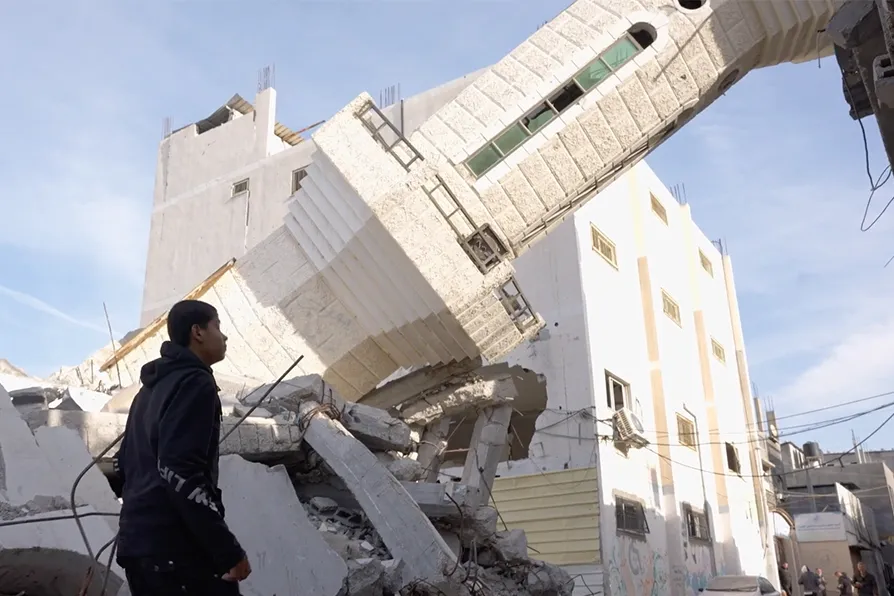GORDON PARSONS applauds a marvellous story of human ingenuity and youthful determination, well served by a large and talented company
RITA DI SANTO draws attention to a festival whose dedication to Palestinian cinema and experience is like no other

 Hassan, directed by Muhammad Al Sharif [Pic: Masharawi Fund for Films & Filmmakers / Coorigines Production]
Hassan, directed by Muhammad Al Sharif [Pic: Masharawi Fund for Films & Filmmakers / Coorigines Production]
ONCE a desolate stretch of desert, El Gouna in Egypt has undergone a stunning transformation over the past 35 years. What was once an arid landscape has blossomed into a vibrant town. This remarkable metamorphosis has breathed life and culture into the region. At the heart of this cultural renaissance lies the El Gouna Film Festival.
Just a five-hour drive from Gaza and Cairo, the El Gouna Film Festival, now celebrating its 8th edition, has emerged as a beacon of cinematic brilliance, attracting filmmakers, actors, and enthusiasts from the Middle East/North African (Mena) region and far beyond. More than a mere venue for film screenings, the festival symbolises the cultural evolution of the region, underscoring the vital role of arts and culture in fostering community bonds and establishing El Gouna as a significant international cultural hub.
This year’s festival has been nothing short of exceptional, showcasing the rich heritage of the MENA region with vibrancy and depth. With the impactful theme A Cinema for Humanity it amplifies the voices of the often unheard, creating a platform for dialogue and reflection on pressing global issues.
This year, the festival engages with contemporary global dynamics through the third edition of “Windows on Palestine,” a special programme dedicated to illuminating Palestinian narratives through cinema. It reflects on the ongoing crisis in Gaza, providing a crucial platform for Palestinian filmmakers to share their stories and experiences.
The programme included seven poignant documentaries filmed in Gaza, part of “From Ground Zero 2,” the continuation of a project initiated by Palestinian filmmaker Rashid Masharawi. This initiative serves as a vital artistic response to ongoing conflicts, using structured expression to offer an intimate glimpse into the daily lives, fears, dreams, and hopes of Gaza’s residents. It emphasises not only the devastation and physical erasure, but also empowers a new generation of filmmakers from Gaza to tell their stories.
Among them, Hassan, directed by Muhammad Al Sharif, follows a 17-year-old boy on a seemingly simple errand to bring flour home to his starving family. Caught in a bombing raid, he is forced to flee to the southern part of Gaza, unable to return home. His family waits in agonising silence, unsure of his fate, while he clings to the hope of reuniting with them. With no clothes, no shoes, and nowhere to sleep, Hassan’s life is turned upside down in an instant, as the camera closely follows him through a life on hold.
Similarly, Very Small Dreams, directed by I’timad Wishah, focuses on the struggles of women in Gaza as they fight for health and dignity. One young woman recounts losing her home, her room, and part of her family, shedding light on the dire health conditions faced by women in the camps, where basic necessities like soap and sanitary pads are scarce, leading to infections.
Dreams Of Farah And Zahra by Mostafa Al-Nabeeh tells the story of two young girls determined to hold onto their dreams. One finds solace in her drawings, while the other expresses herself through music. Together, their creative endeavours become acts of resistance, reminding us that imagination can serve as a lifeline. They aspire to inspire hope in the children around them, but grapple with the harsh realities of their stories. One dreams of returning home, only to find it destroyed upon her return.
Gaza To Oscar by Alaa Damo follows a filmmaker in Gaza who risks everything to document life under siege, hoping his work will one day reach the world’s grandest stages, ensuring his people are remembered in his own words. “Cinema will never be under occupation,” he asserts, emphasising that it is the only space where he feels free.
Despite their rudimentary aesthetics, these documentaries reveal a profound desire to tell stories. Each protagonist possesses a remarkable artistic vision, reflecting on their homeland. In every documentary, the backdrop remains hauntingly consistent: images of ruins, people traversing the streets, and the palpable anger of those caught in the turmoil. The camera captures a loss of humanity, bearing witness to a grim history of human suffering.
This is no longer just Gaza; it resonates with the echoes of history, narrating the horror of war. The camera stands still, serving as a station for memory, reminding us of the urgent need to remember what is happening. This is where cinema transforms into a weapon, a witness to reality.
“Window on Palestine” also showcased Mahdi Fleifel’s A World Not Ours (2012), a masterclass in documentary storytelling that peels back the layers of Lebanon’s Ain el-Helweh refugee camp with unflinching honesty. Shot with intimacy and humour, Fleifel’s video diary captures the complexities of the camp’s inhabitants, their resilience and humanity shining through.
The film emerges as a nuanced, deeply human portrayal of life in limbo, transcending politics and geography. Even a decade later, its themes of displacement, occupation, and identity remain painfully relevant, resonating eerily with recent works like Ground Zero 2. Fleifel’s lens serves as a powerful catalyst for empathy and understanding, establishing A World Not Ours as a landmark of contemporary documentary filmmaking.
“Cinema saved us and was the only thing for us when the world failed us,” reflects Palestinian filmmaker Rashid Mashrawi, who conceptualised the programme. “We are not just showing films; we are building bridges and proving that nobody can occupy cinema.”









